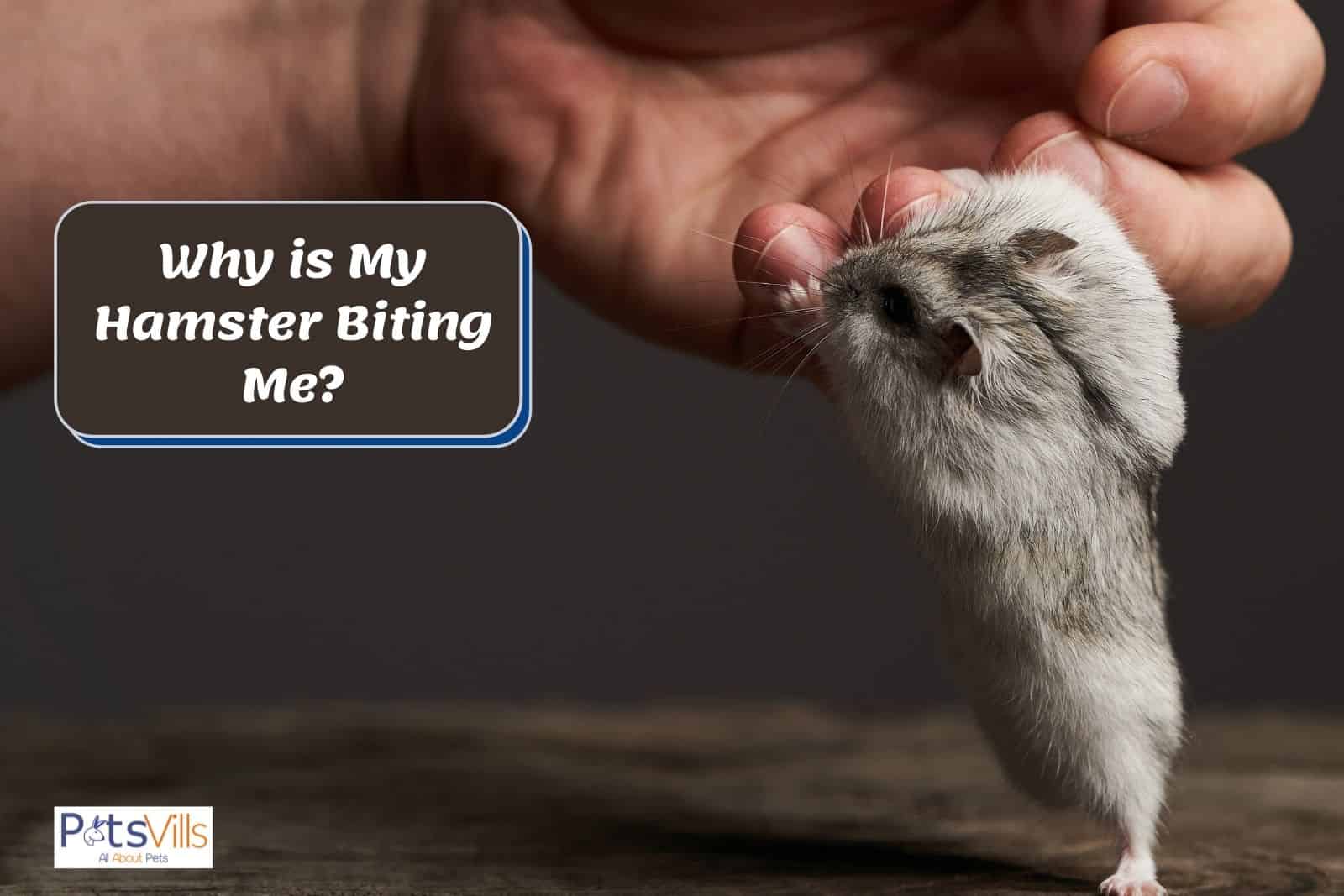Why is my hamster biting me, and how can I stop it?
Hamsters love to bite everything they come into contact with: food, metal, wood… and occasionally, you.
This isn’t ideal, so it helps to know why your hamster is biting you all of a sudden.
Let’s look at some of the most common reasons.
Get Your Own Hamster Owner’s Handbook!
Table of Contents
Why Is My Hamster Biting Me?
Your hamster could be biting you all of sudden for a few reasons:
- Your hand smells like food.
- Your hamster doesn’t like being handled.
- Your hamster doesn’t trust you yet.
- You are startling your hamster.
- Your hamster has cage rage.
If your hamster has started biting you out of the blue, the rest of this article will help you narrow down why this is happening and how you can fix it [1].
Learn your pet’s body language in this guide!
Possibility #1: Your Hand Smells Like Food
Hamsters have notoriously bad eyesight. They’re not quite as blind as bats, but they’re pretty darn close. As such, they rely heavily on their sense of smell to identify the objects in their immediate surroundings.
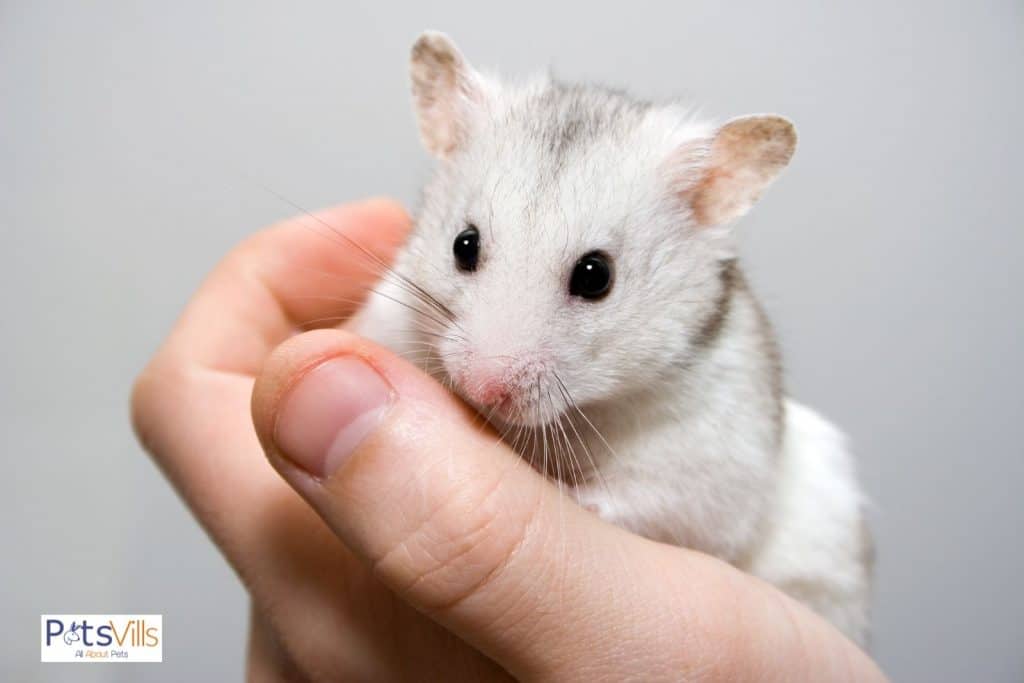
So when you’re reaching your hand into your hamster’s cage to pet or hold them, they might be mistaking your fingers for tasty morsels.
This is likely if you’ve recently handled food, especially if it was something your hamster would find particularly scrumptious.
If you think this might be the cause of your hamster’s biting, no worries. There are a few simple strategies you can employ that will prevent your hamster from thinking your fingers are edible.
- Wash your hands with soap and hot water before handling your hamster. This will remove any trace of food scent and hopefully save your hands from some bite marks.
- Before handling your hamster, rub your hand in their bedding. This will indicate that you are not food but in fact part of your hamster’s natural environment. If you don’t want to rub your bare hands in your hamster’s bedding, wearing gloves before doing so is a perfectly acceptable alternative.
- After washing your hands and rolling around in bedding, try giving your hamster a treat while you’re holding him. This should let your hamster further separate your smell from the smell of food. Your hamster will also love you more for giving them a snack, which is always a plus.
Check: Do Hamsters Make Noise?
Possibility #2: Your Hamster Doesn’t Like Being Handled
Another possibility is that your hamster just doesn’t like being handled.
Like humans, each hamster has its own unique personality. Some of them are shy, skittish types who don’t want giant, scary humans touching them.
If you have a hamster like this, you can definitely try to make them comfortable in your presence. You just need to be willing to leave them alone if they are clearly not interested in your company.
The best way to fix this problem is to tame your hamster [2].
I recommend watching this excellent video by Victoria Rachael, who walks you through all the steps needed to tame your hamster in a quick and efficient manner.
READ MORE: Do Hamsters Blink?
Possibility #3: Your Hamster Doesn’t Trust You Yet
If you recently brought your hamster home, there’s a decent chance it still isn’t accustomed to your presence.
Remember, you’re an absolute giant in your hamster’s eyes, and they may very well view you as a potential predator at the start of your pet-owner relationship.
Here are a few simple things you can do to get your hamster to start trusting you:
- Give it time. You’re not the only thing new to this hamster. Everything else around it is also new. The cage, housing, bedding, food, water, and everything else are completely foreign to it. Your hamster will need time to adjust to all of these radical changes.
- Approach the cage slowly. Don’t make any sudden movements, and talk in a low, soft voice when you near your hamster. This will alert your hamster to your presence, and prevent it from getting surprised (we’ll talk more about this in the next section).
- When attempting to hold your hamster, place your hand just in the entrance to the cage. Let the hamster come to you. Don’t chase it around the cage, as this will just frighten it and make it even harder to gain trust.
- Hold your hamster for small periods of time every day. Start extremely short, no more than a minute. Gradually, as your hamster grows more comfortable with your presence, you can move up to periods of five minutes or more.
- Give your hamster healthy treats. Once your hamster starts to associate your presence with yummy food, they will begin to trust you more.
READ: Why Are Hamsters Nocturnal?
Possibility #4: You Are Startling Your Hamster
The next reason your hamster might be biting you is that you are startling the poor little thing.
If you are attempting to hold your hamster while it’s asleep or eating or drinking, it will likely react as if you are a predator, and instinctively turn around and bite you.
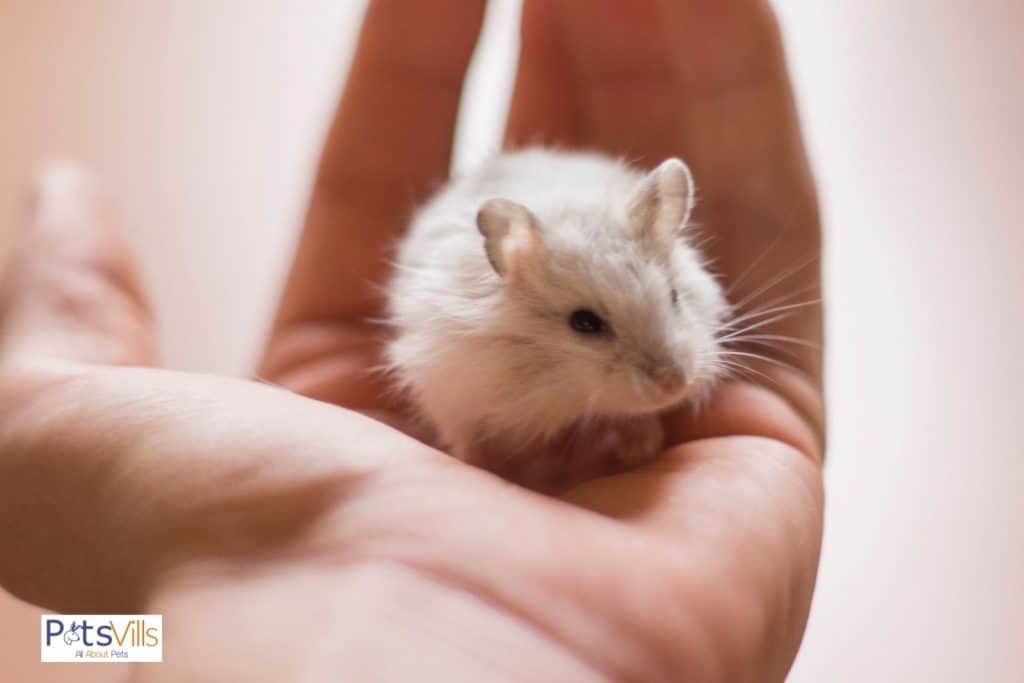
So even if you’re ready for playtime, your hamster might not be.
Before attempting to take your hamster out of its cage, make sure it isn’t sleeping or otherwise preoccupied. You should only approach your hamster and attempt to pick it up if it is fully aware of your presence.
Again, the best way to do this is to place your hand in the cage entrance and wait for your hamster to come to you. You can also place a treat in your hand to encourage your hamster to scurry over and check you out.
Check out this video to learn some great tips to keep your hamster calm and relaxed.
Possibility #5: Your Hamster Has Cage Rage
Hamsters, like all living things, need ample room to run around and live. If you don’t give your hamster a large enough cage to comfortably live in, there’s a pretty good chance your hamster will develop Cage Rage [3].
Cage Rage is a psychological disorder that animals who live in cages are susceptible to. Any animal living in a cage too small for it is at risk.
So if your hamster is exhibiting any of the following symptoms (in addition to the biting), Cage Rage might be the cause:
- Extreme aggressiveness toward you or other hamsters
- Outward signs of anxiety and stress
- Seemingly endless bar biting (I’m talking hours of nonstop chewing)
- Destroying toys, nest, food bowl, etc.
- Squeaking and spitting when you come near them
- Racing around the cage
If you do suspect Cage Rage is the reason your hamster is biting you, there are a few steps you can take to treat the disorder:
- Get a larger cage, preferably in an area with adequate air flow (no damp, musty rooms).
- Move your hamster to a neutral area a few times a week for exercise and play.
- Switch to a clear glass aquarium tank with a ventilated mesh lid. This can prevent tooth damage from bar biting.
- Replace your hamster’s nesting box with a larger one.
Caringpets.org has a great article on hamsters behavior and how to avoid your hamster fighting. It is a fantastic resource that you may want to give a read [4].
Check: Do Hamsters Eat Cockroaches?
How to Train Your Hamster Not to Bite
To stop your hamster from biting, you need to remain patient and calm and gradually build trust with your hamster.
Your hamster needs to learn that they can trust you and that you’re not going to harm them.
It can take a while for your hamster to build trust with you and how long it takes will vary depending on each individual hamster.
Week 1: Introducing Yourself
In the first week, you need to calmly introduce yourself to your hamster so that they can start to recognize your smell and voice.
When you approach your hamster you need to make sure you’re doing it in a calm, gentle, slow manner that doesn’t startle the hamster.
Being loud and moving in fast motions can scare your hamster.
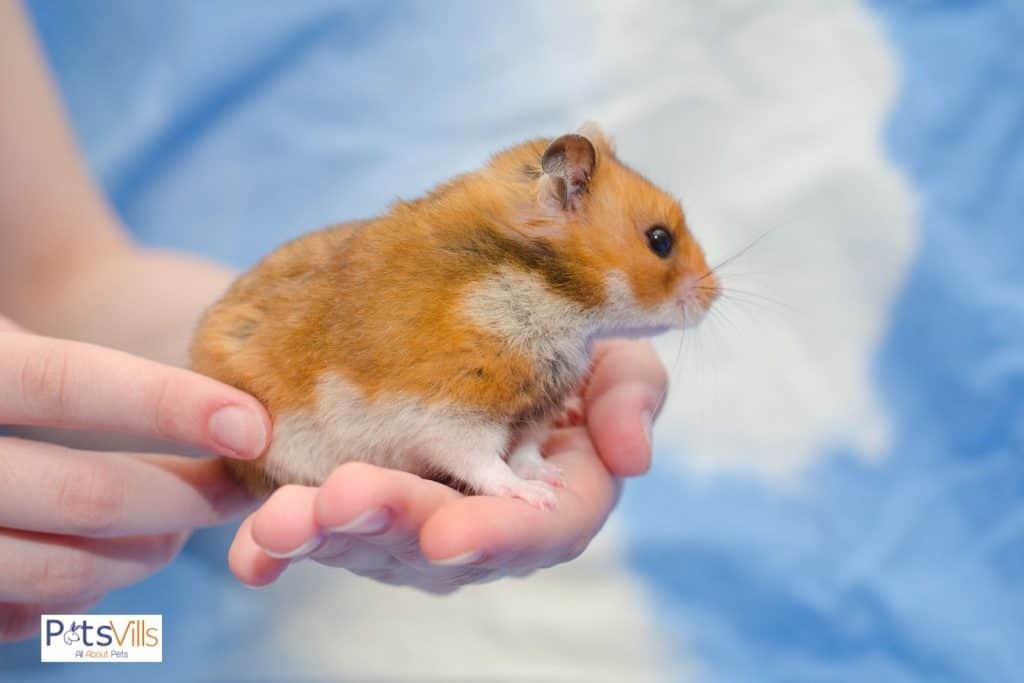
In the evenings (when hamsters are most active) start to introduce yourself by softly talking to your hamster so that they can learn your particular voice and tone.
It’s best not to touch your hamster or pick them up this week as they are still getting used to their environment.
Curious about why your hamster is trying to escape? Check out our article for insights and tips on how to keep your furry friend safe and happy.
Week 2: Putting Your Hand in Their Cage
Once your hamster is getting more familiar with your tone, you can start putting your hand in their cage and waiting for them to come to you.
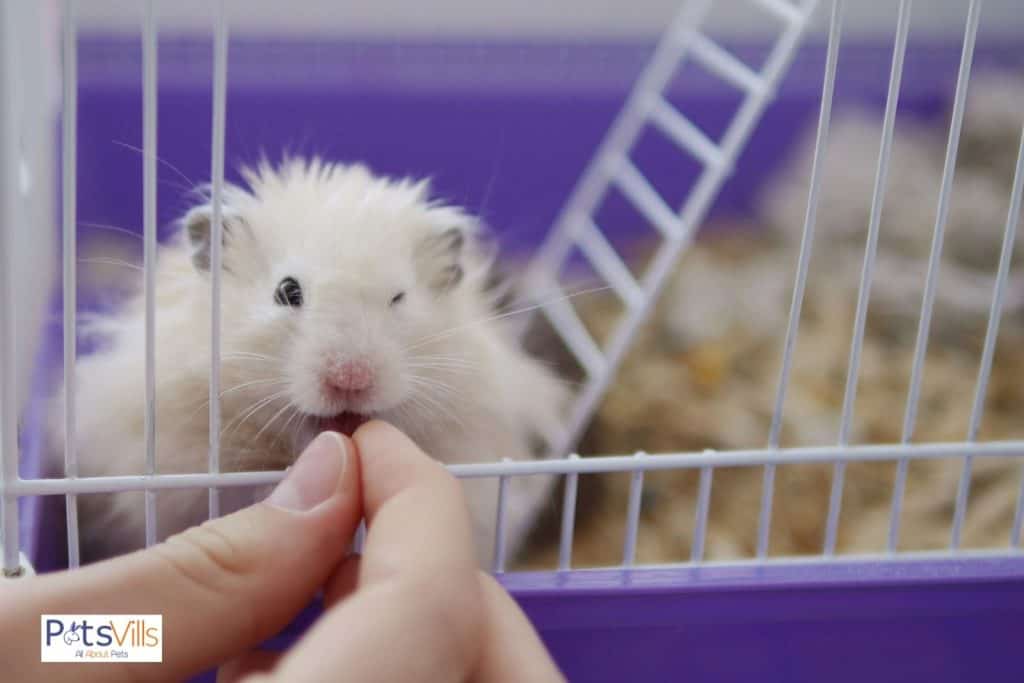
Don’t put your hand in their cage and try to pick them up, but let them come to your hand so they can start to smell you and get used to your scent.
Week 3: Treat Time
Once they are familiar with your scent, you can now start offering them treats.
This is where the trust really starts to build as your hamster will start associating you with treats and food.
Week 4: Petting and Picking Them Up
Once you feel like your hamster has become familiar with you, you can now start to pet and pick them up.
If your hamster won’t stop biting you, even though you’ve been trying for weeks to build trust. It might be a good idea to wear gloves while handling your hamster.
Check out this great video:
FAQs
What should I do if my hamster bites me?
If your hamster bites you and breaks your skin, you should thoroughly wash the cut with hot water and soap. After that, apply some antibiotic ointment and place a bandage over it.
How do I make my hamster stop biting me?

To stop your hamster from biting you, make sure you wash your hands before touching your hamster and approach your hamster slowly and softly. Start giving your hamster treats and build trust.
Why is my hamster aggressive?
It can be for many reasons. They can be stressed, in pain, or uncomfortable in their current environment. If the behavior consists and you’re not sure what to do, it’s best to take your hamster to the vet for a checkup.


References
- 1. Chewy Editorial. How To Stop A Hamster From Biting [Internet]. BeChewy. Chewy; 2017 [cited 2021 Dec 8]. Available from: https://be.chewy.com/how-to-stop-a-hamster-from-biting/
- 2. https://www.facebook.com/thespruceofficial. Learn How to Handle and Tame Your Pet Hamster [Internet]. The Spruce Pets. 2021 [cited 2021 Dec 8]. Available from: https://www.thesprucepets.com/how-to-handle-and-tame-pet-hamsters-1238956
- 3. ThePetMaster. Cage Rage in Hamsters: The Complete Guide [Internet]. PetHelpful. PetHelpful; 2015 [cited 2021 Dec 8]. Available from: https://pethelpful.com/rodents/Cage-Rage-in-Hamsters-The-Complete-Guide#:~:text=Cage%20rage%20is%20a%20genuine%20psychological%20disorder%20that,being%20kept%20in%20a%20cage%20far%20too%20small.
- 4. When Hamsters Fight – Aggressive Behavior & Body Language [Internet]. Caring Pets. 2021 [cited 2021 Dec 8]. Available from: https://www.caringpets.org/how-to-take-care-of-a-hamster/aggression-fighting/
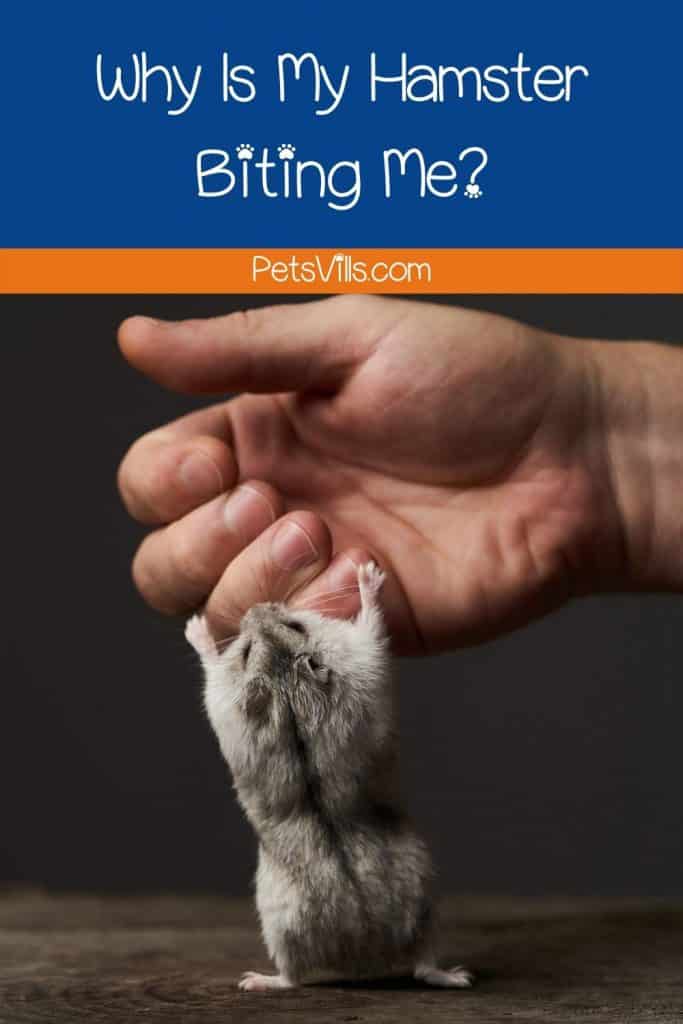
Did your hamsters ever bite you? Please share with us in the comments
Alina Hartley is a small-town girl with a ginormous love of bearded dragons. It all started with Winchester, a baby bearded who was abandoned at the shelter by his former owners because of a birth defect that caused one front leg to be shorter than the other. Alina originally went to the shelter looking for a guinea pig, but one look at Winchester and it was love at first sight. From that day on, Alina has dedicated her life to learning everything she can about bearded dragons. She loves helping new beardie parents start their incredible journey with these magnificent reptiles.
Follow her on:
LINKEDIN
TWITTER.
Read her latest articles HERE
Learn more about her HERE.

